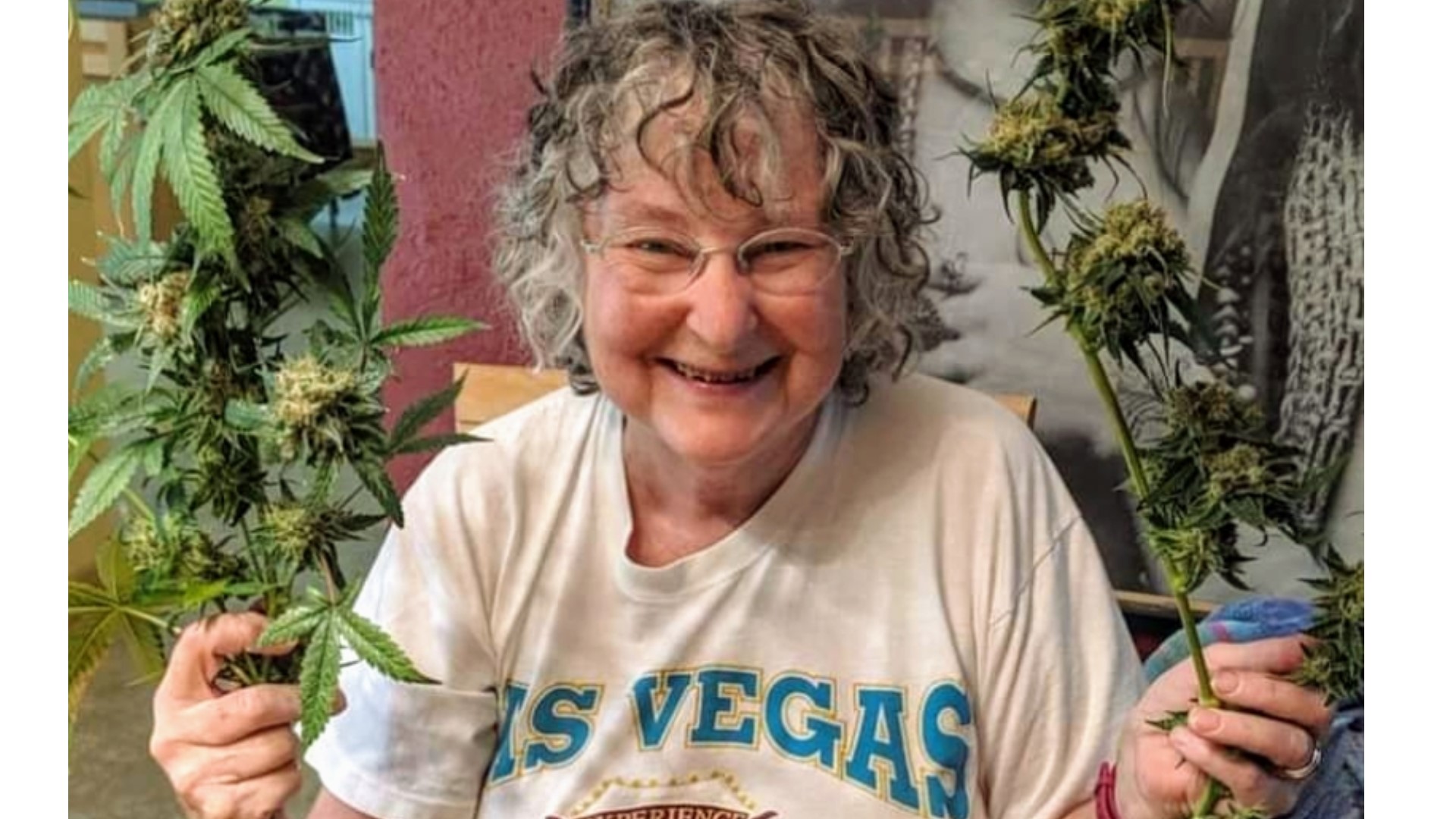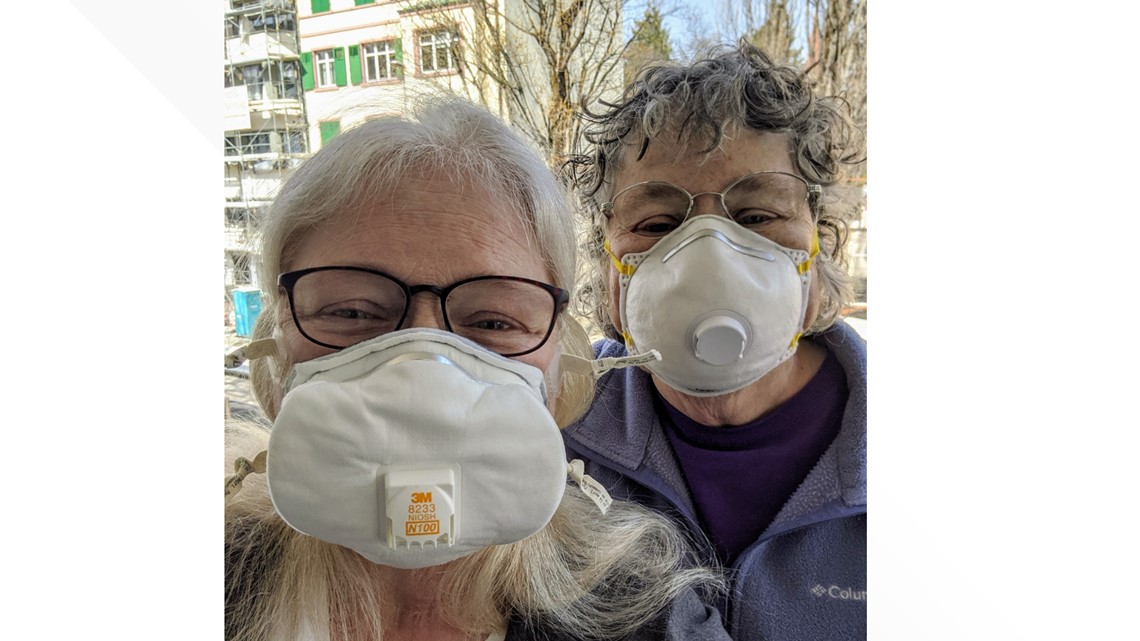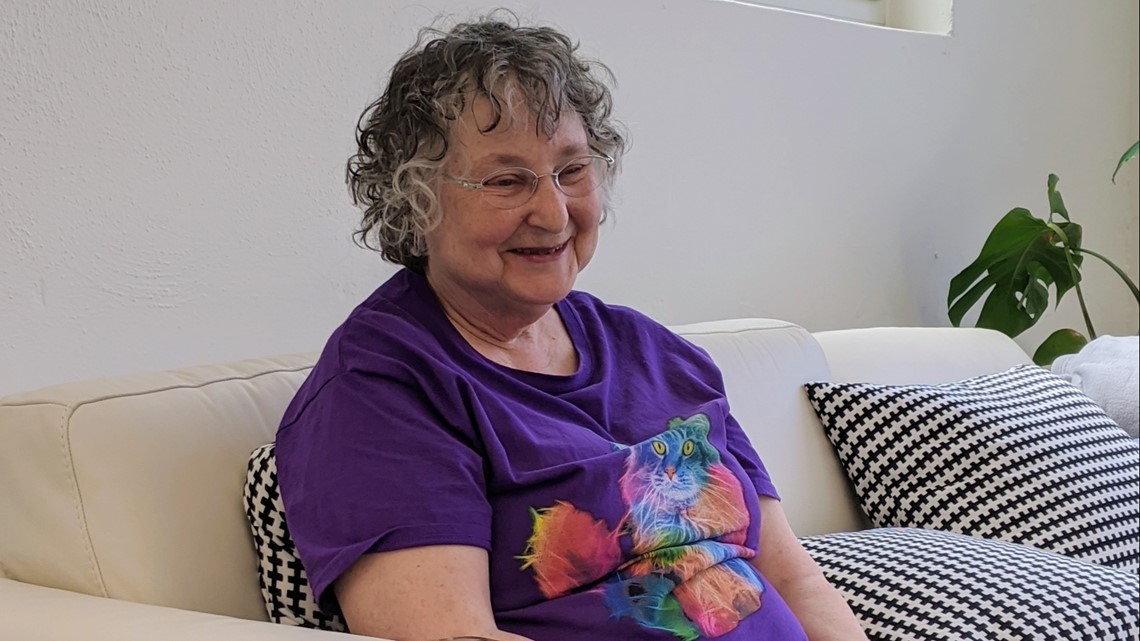'Granny Loved Weed': The cause at the heart of an eye-catching obituary
An Oregon woman diagnosed with Alzheimer's hoped to use the state's Death with Dignity Act, but instead had to fly to Switzerland during a pandemic.

Clutching handfuls of marijuana and wearing a souvenir T-shirt from Las Vegas, Anne Parker’s smiling face appeared in Portland newspapers last week.
The obituary headline in the Portland Mercury matched the tone of her happy photo: "Granny Loved Weed."
Amid a global pandemic rife with headlines of sickness and death, the family wanted to make sure the 70-year-old Portland native’s obituary got noticed.
The main message, embedded multiple paragraphs below, was serious.
"I think it's kind of important that people know what happened to her," said her grandson Joel Bocek. "I'm sure there's other people that are in the same situation or have been through it and have been kind of a bit frustrated."
To be clear, Parker, known as "Grandma Anne" to much of the family, didn’t die of COVID-19. She didn’t die of Alzheimer’s disease either, despite having been diagnosed with it a year and a half ago.
She died of a lethal dose of the sedative Nembutal, administered legally by an IV, while she sipped champagne in a Swiss doctor’s office.
Parker chose to end her life before, in her opinion, Alzheimer’s made it not worth living.
That said, to die on her terms, the Portland State alum and retired social worker had to flee her home state of Oregon, the first state in the country to pass legislation allowing terminally ill patients to choose to end their lives.
Monday, via multiple phone and Zoom interviews, Parker’s family kept her message alive a month after her death.
"There is no death with dignity for Alzheimer's in Oregon," said grandson Jordon Bocek, Joel’s brother.
Oregon's Death with Dignity Act Chapter 1
Passed in 1994, Oregon’s Death With Dignity Act stands as a beacon and a model for supporters of the movement nationwide.
To end their life under the state’s DWDA, a person must be at least 18 years old, an Oregon resident, capable of making and communicating their own decisions and diagnosed with a terminal illness that will, according to their physician, lead to death within six months.
State officials release annual reports on how often the law is put to use.
At the end of 2019, 2,584 people had received prescriptions for the lethal dose of medication since law took effect. In that same time, 1,657 people had used the medication to end their lives.
Family members said Parker made it clear years ago she would seriously consider the option were she diagnosed with Alzheimer’s.
The disease had killed her mother slowly and painfully years prior.
"Anne did not fear much. She was a very confident and gregarious person and really liked to help other people, but the one thing that she feared was Alzheimer's and having to live through that," said granddaughter Anna Bocek.
When she was diagnosed after months of forgetting details and repeating conversations, the family assumed Parker would pursue her plan.
Everyone was jarred when they realized that wouldn’t be possible.
"I had initially gone through the years going, 'Oh great, well we live in a really liberal state, and there's death with dignity, and it's there if it's needed and all that stuff,'" said Anna. "Then yeah, it became abundantly clear that that was not something that was helpful here."


The family soon learned Alzheimer’s disease, like other progressive cognitive conditions, falls into a problematic middle ground between two of the DWDA’s criteria.
By the time a person diagnosed with it has six months or less left to live, they’re often unable to make their own decisions or communicate their own desires.
It’s a clear disqualification.
"I was personally kind of surprised that there wasn't any sort of anything that anybody could do in Oregon in that sort of situation," Anna said. "I understand the liability aspect of it and all that, but that is a huge set of people that ended up stuck."
"It's loss of quality of life, a loss of self," Anna's older brother Jordon said of the disease his grandmother feared.
Regardless of the shock, Parker and her family agreed they didn’t have time to waste.
Research began and soon plans were underway to travel to one of few places in the world that allows someone in Parker’s position to legally end their lives.
She, along with family, would go to Liestal, Switzerland where the Pegosos Association would help with final arrangements, given that she provide necessary documentation.
In an email to KGW, president of the Pegasos Swiss Association Ruedi Habegger said, "Swiss law and regulations permit an assisted dying, when a psychiatrist or neurologist has made an in-depth assessment, showing that the person is mentally competent to make that decision, and why he/she is competent to make that decision in spite of certain illnesses with memory-difficulties etc. Also to establish that this is a wish that has been reflected on well, and that there is no pressure from any third party, establishing without a doubt, that it is his/her own decision to have a VAD (Voluntary Assisted Dying) and no one else."
Parker sent the proof. Soon she received word she could travel to Switzerland to die in April 2020.
But by January, of course, the world would throw the Portland family another curveball.
"She could have waited a little while longer if the COVID pandemic hadn't hit and it forced her and my family to rush the process," Joel said.
Rushing to die Chapter 2
By early March, Anne Parker’s family was realizing the little time they had left with their "chosen grandmother," a term lovingly applied to their non-blood relative, might be cut even shorter.
The COVID-19 pandemic was sparking global chaos, both in the medical community and the travel industry.
Parker, determined not to miss her chance to escape Alzheimer’s brutal wrath, decided she would go to Switzerland early, alone.
Her chosen daughter Tikva Lynn Siva-Wentzel, who declined to be interviewed, demanded to travel with her.


For the Bocek siblings, that meant saying goodbye to their grandmother, knowing she was leaving a month earlier than planned to die. It also meant saying goodbye to their mother, hoping she’d come home safe and healthy amid an historic health crisis.
"The whole process was a nightmare ... They were basically fleeing a pandemic to go die," said 41-year-old Jordon. "So many canceled flights and so many last-second, perfect-luck occurrences had to line up to make it all work. It was constant communication between all the family members for a long time … Makes you old quick."
Despite fast-tightening travel restrictions, the two women made it to Switzerland with no promise of an earlier appointment.
A week and a half later, one opened up.
The pair drank champagne while a doctor explained that, when she was ready, Parker could pull a lever on her IV, administering the drugs.


The grandkids later heard she went peacefully.
"After she died, the doctor came into the room and handed my mom a glass of champagne, and apparently Ann had requested that he do that," Joel said, laughing. "I think that kind of sums up the sort of person she was. Rather than my mom just feeling sad and alone, [she’d] have the doctor bring her a nice cold glass of champagne so that they could celebrate."
Siva-Wentzel made it back weeks later and, though she tested negative for COVID-19, has been in quarantine since.
"None of us have been able to give her a hug after all of this. That's kind of harsh," Joel said. "All of this could have been avoided if Anne would have just been able to do what she wanted to at home."
Another push to expand Chapter 3
The family, via Parker’s obituary and subsequent interviews, is calling for changes to Oregon’s DWDA to allow for people diagnosed with Alzheimer’s and diseases like it to end their lives while they’re still able to make their own decisions.
Granted, they know that’s a difficult line to walk.
"With Alzheimer’s … you have to go too soon. If you wait until the cognitive decline is super, super apparent, then you can't make your own decisions. So yeah, it's, it's a very strange spot to be in, not trying to jump the gun so to speak," Joel Bocek said via Zoom Monday. "Basically it's kind of a Catch-22."
Concerns like that, along with other factors, have stood in the way of such changes in the past.
During the 2019 legislative session, State Representative Mitch Greenlick sponsored House Bill 2232.
Among other things, it aimed to change the DWDA’s requirement that a patient have six months or less to live.
Instead, the patient would have had to have been diagnosed with "a disease that will, within reasonable medical judgment, produce or substantially contribute to a patient’s death."
Critics argued it would "broaden the definition of terminal illness to the point that the term is stripped of any logical or cogent meaning."
The bill never made it out of committee, dying as GOP members staged a mass walkout over the controversial carbon-emissions bill, known as Cap and Trade.
Similar efforts have failed in the past, including a 2015 attempt by Greenlick to expand the six-month window to one year.
Via email Tuesday Rep. Greenlick, a retired director of the Kaiser Permanente Center for Health Research, said opposition to expanding the DWDA has come from both sides.
"We have been the national leader. That is one of the reasons the supporters of [the Act] do not want to change it. They argue it works well and there has been no slippery slope. They believe their job expanding to other states will be made more difficult if we modify the program," Rep. Greenlick wrote. "The program needs expansion because it does not serve everyone who could benefit."
But not every attempt to change the reach of the DWDA has fallen flat.
In early 2018, Oregon lawmakers passed legislation — in a party-line vote, with Democrats prevailing — that would study how to improve the process of creating and carrying out advance directives.
Advocates hoped it would lead to a new form of advance-directive, similar to 'Do Not Resuscitate' orders, instructing caregivers to withhold spoon-feeding and speed up death, if and when the patient becomes incapacitated by dementia.
The idea enraged members of the anti-abortion advocacy group Oregon Right to Life.
Speaking to the Washington Post in 2018, executive director Lois Anderson said of Alzheimer’s patients, "They might not be able to get in a car and drive to Seattle, but they maybe have agency to decide what movie they want to watch, or if they want to go to the sun room, or do they want to eat. We believe that that agency, that ability to make those decisions, should be respected. That’s part of human dignity."
In July, lawmakers modified the Act again, allowing people in the final weeks of their life to bypass the standard 15-day waiting period, a change that took effect January 1st, 2020.
Since her diagnosis and death, Anne Parker’s family has become increasingly aware of the arguments for and against changes to the DWDA.
It’s why they were eager to add her obituary to the conversation.
"It was infuriating that she could not end her life the way she wanted in her own house, in her own bed or on her couch or something … She swore up and down she would never let it happen to her, and pandemic be damned. Excuse me," said Jordon Bocek. "But it was painful in the fact that it was so stressful and so rushed in the end."
Parker’s grandchildren also hope a broader message reaches people who might have never given thought to the idea of how they or their loved ones want to die.
"Especially in light of the pandemic and all this stuff, I really strongly encourage people to have the conversation with their family members about what their wishes are. I can't tell you how much easier it is, being able to have an open conversation with your loved ones about what they want and what needs to be done and how things are going to go instead of having to scramble at the last second and agonize over it and have family members argue over it," Anna Bocek said. "I've seen both ends of the spectrum there and I strongly prefer people being open with each other, and I really suggest that others do the same."


